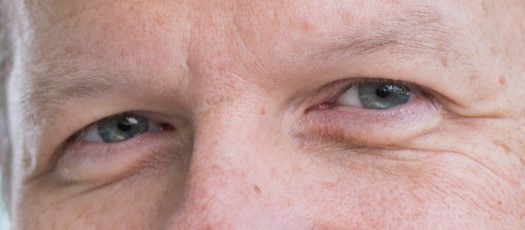To answer the question right out of the gate, I’d say no, because no single phenomenon or example can “prove” that God exists.

(Someone is watching you ….)
The question comes from the headline of an article in The Telegraph — in the “film” section, no less — that discusses what a wondrous mechanism the human eye is, with its “astonishing inbuilt systems.”
Take, for example, a little trick called the vestibulo-ocular reflex (VOR). In short, it’s our own personal Steadicam — an inbuilt muscular response that stabilises everything we see, by making tiny imperceptible eye movements in the opposite direction to where our head is moving. Without VOR, any attempts at walking, running — even the minuscule head tremors you make while you read these words — would make our vision blurred, scattered and impossible to comprehend.
As one who finds very jittery camera work in movies (like District 9) and some video game action (like the rolling ball in Katamari Damacy) very disorienting — to the point of physical illness — I am very grateful for the VOR!
But that’s not all:
… researchers have discovered the retina is doing a huge amount of pre-processing itself – and that as light passes through the retina’s several dense layers of neurons, a lot of detail like colour, motion, orientation and brightness are determined.
When I took a laser safety course (many years ago), we were told that the retina was put together opposite the way an optical engineer would have designed it, because the rods and cones actually point backward, into the retina itself, instead of forward toward the lens. This newly-found pre-processing function may have something to do with that, though personally I wonder if turning the sensors around would make our eyes more susceptible to damage from very intense lights.
Things like that make the question of deliberate design vs. development by natural selection interesting. As the article puts it,
Even today, Christians and creationists believe that Charles Darwin himself was troubled by its existence — seizing upon an (oft-misquoted) aside in Origin of Species, where Darwin remarked that the whole idea of something so flawless “could have been formed by natural selection, seems, I freely confess, absurd in the highest degree.”
The full Darwin quote, with the important next sentence, is:
To suppose that the eye with all its inimitable contrivances for adjusting the focus to different distances, for admitting different amounts of light, and for the correction of spherical and chromatic aberration, could have been formed by natural selection, seems, I freely confess, absurd in the highest degree. Yet reason tells me, that if numerous gradations from a perfect and complex eye to one very imperfect and simple, each grade being useful to its possessor, can be shown to exist; if further, the eye does vary ever so slightly, and the variations be inherited, which is certainly the case; and if any variation or modification in the organ be ever useful to an animal under changing conditions of life, then the difficulty of believing that a perfect and complex eye could be formed by natural selection, though insuperable by our imagination, can hardly be considered real.
Thus something that seems absurd may still be possible, and even reasonable. The question is whether it matters. For instance, whether it matters to a believer that sufficiently different eyes can be understood by natural selection to lead to the human eye. Or whether it matters to an unbeliever that the believer attributes the eye’s complexity to the influence of a creative God.
The eye still exists, and some of us can praise God for it even though its existence is insufficient to prove that God exists.
And that’s okay. After all, faith is “the evidence of things not seen.”*
___
*Hebrews 11:1 (KJV)






